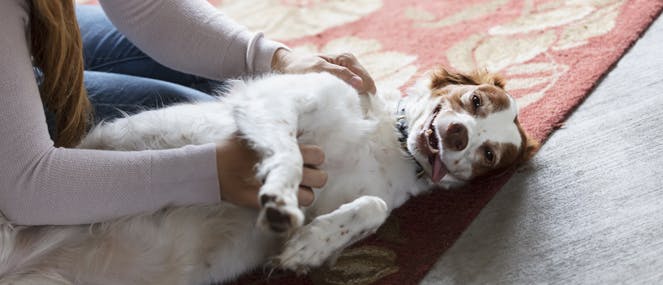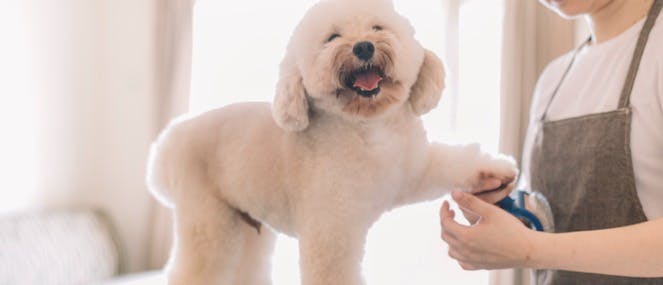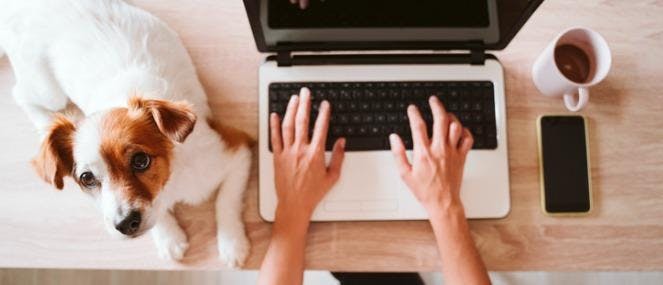
- A Guide To Perfect Your Pet's Health/
- Health and Vitality Products For Your Dog/
- Improving Dog Health - Weight, Digestion & Stress


How you can manage your dog's health.
Is your dog anxious, overweight, or do they regularly suffer from dog gastro? Or are they a happy puppy, with few dog behavioural problems, a lean frame and a healthy appetite? Dogs tend to reflect our emotions and our health habits. They can certainly influence them in a positive way, with numerous studies showing the companionship provided by a pet improves psychological and physical health.
Unfortunately, they can also pick up on some of our unhealthier cues, such as letting stress overwhelm us. Ever noticed that when you’re upset, your dog seems to sense it? We can’t really do anything about that, because life has its ups and downs. But simply being aware of how intuitive our dog is, and how they respond to our emotions, can be helpful.
Here’s how you can have a positive influence on your dog’s health.
Challenge one: Your dog is carrying a few extra kilograms.
As many as 41% of pets are overweight or obese, according to the Australian Veterinary Association. Unfortunately, being above their optimum weight for dogs is associated with both dog arthritis and dog hip dysplasia because of the stress it puts on joints, especially in older animals.
Overweight and obesity is also linked to heart disease, liver disease, skin problems and increased risk during general anaesthesia. Being confused about what to feed your canine, overfeeding them, or not exercising them for their age or breed can all contribute to the pet battle of the bulge.
While we may think we are being kind by sharing our takeaway food, such as pizza, with our dog, or by allowing them to spend extra time on the sofa, this can backfire.
For dogs who are prone to dog gastro, or for pancreatitis in dogs, high fat treats are definitely off the agenda while, for other canines, it’s best to give only an occasional ‘treat’ food, especially if they have a weight issue. Too much couch time can also stiffen joints and muscles. Like us, dogs need regular exercise.
What you can do:
+ See your vet to discuss your pet’s ideal weight and help formulate a weight loss plan, as well as check in with your doctor for some slimming tips. Feeding your dog the right amount of food for its age, or activity level, will make a real difference to their health and happiness.
+ Diary exercise for your pet in the a.m. and p.m. A minimum of 20 to 30 minutes is ideal although, for an older pet with dog arthritis, gentle exercise is best. For early and advanced care for joint health & arthritis management, PAW by Blackmores also offers a number of natural pet products.
+ Be persistent. Weight loss is a gradual process. Regular weigh ins – once a week or a fortnight – can help with motivation.
+ Try our action plan for getting fitter with your dog.
Challenge two: You dog is carrying a few extra kilograms.
If your pet is often affected by dog gastro, it’s time to have a look at their digestive health. Common causes of an upset stomach in dogs include not only bacteria and parasites, but adverse reactions to certain foods, as well as poor gut health.
To reduce stomach problems such as constipation, flatulence and diarrhea, your canine will respond to a healthy diet that enhances the gut microbiome.
What you can do:
+ Talk to your vet about what dogs can and cannot eat. Junk food full of salt, sugar and chemicals is just as detrimental in the long-term for dogs as it is for humans and can impact not only weight but cause dog gastro symptoms.
+ Make tummy-friendly eating easy by stocking up on lean meats and/or vet-approved food for your dog. They can also eat some vegetables and a little fruit if you want to add some variety to their diet. Apples are a great source of vitamins A and C, to help keep your dog’s skin and coat healthy; while carrots, peas, green beans and sweet potatoes contain plenty of important vitamins, as well as potassium for your dog’s muscles, nerves and kidneys. The fibre can also help prevent constipation.
+ Try a regular probiotic product for your dog such as PAW DigestiCareTM that can provide good bacteria that restores and improves intestinal balance.
+ Enrol in our four week doggy digestion plan.
Challenge three: Your dog seems stressed or anxious.
A small Swedish study found that it is possible for dogs to pick up on our stress. But rather than let that stress us out, it’s a good opportunity to schedule in some more relaxation. If your dog does seem on edge, there are also some good options to improve their health.
What you can do:
+ See your vet to rule out any physical causes of anxiety such as thyroid disease or toxin exposure.
+ Consider lifestyle changes including regular exercise and play, proven to increase feelgood hormones and reduce anxiety-provoking stress.
+ Dogs love relaxation, and so do we. The good news is that it switches a hyped-up nervous system in fight or flight mode into healing mode, says psychotherapist Shirley Hughes. You may like to play soothing music, or burn an essential oil like lavender.
+ Sessions with a trainer or behavioural therapist may help your anxious dog.
+ A product containing tryptophan such as PAW Complete Calm may help relax your canine. If your vet needs to prescribe anti-anxiety medication for your dog, it’s important to check in with them before giving your dog a nutraceutical.




